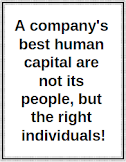Teacher Recruitment
What should all be looking for in new staff?
“Human capital is an asset consisting
of the knowledge and skills held by a person that can be used by an
organization to advance its goals”
[1]
Recruit seekers should stick to a clearly defined job description to identify
the precise candidate who can become passionate about the organization’s aims.
As stated by Lewin (2020), a company’s best
human capital are not its people, but the right individuals. Many people can
apply for a job out of need, but not all of them are right candidates for a
position. In the case of a education company, the teaching personnel has to be
qualified for, enthusiastic about, and devoted to teaching, elements that must
be part of the job description. For instance, this has to be done bearing in
mind that a top student at a university is not necessarily the right applicant.
And teaching training is not the solution to help teaching staff advance in
their professional development when they are not aligned with the institution’s
goals because they are hiried without being the right candidates for a position.
[2] “The
staffing function of human resource management searches, recruits and
acquires employees with the human capital necessary for the organization’s
needs”
[3] Kenton (2019)
argues that “An organization is often said to only be as good as its people.”
What do we then pay attention to during a job interview as a recruit seeker to
continue finding good people? Lewin (2020) answers this question quite simply;
we pay attention to everything! An in order to focus on everything, the job interview,
e.g. for a language teacher, has to be organized with a set of highly
professional questions that can yield the real attitudes of the candidate. The
recruiter needs to delve into knowing what this person liked about his/her
former job, what his/her areas of improvement are, about his working
antecedents, why the person wanted to become an educator, the reasons why s/he
studied at the university the person studied at, how s/he could be defined by
his/her former students and employers, etc.
[4] “Human
capital is an intangible asset or quality on a company’s balance sheet”
There are probably
more areas that a recruiter has to focus on while interviewing a candidate.
However, Lewin (2020) warns us to beware of the halo effect. “The halo
effect refers to the idea that our overall impression of someone will directly
impact how we perceive almost everything they do”
References
Grimsley,
S. (2014, May 7). What Is Human Capital? - Importance to An Organization.
Retrieved August 16, 2020, from Study.Com:
https://study.com/academy/lesson/what-is-human-capital-importance-to-an-organization.html
Kenton, W. (2019, May 28). Human Capital.
Retrieved August 16, 2020, from Investopedia.Com:
https://www.investopedia.com/terms/h/humancapital.asp
Lewin, L. (2020, August
11). Selección de Personal. Escuela para Directivos. Buenos Aires,
Argentina.
Miller, B. (2018, October 2). How the Halo Effect
Impacts Your Workplace. Retrieved August 16, 2020, from
HRDailyAdvisor.blr.com: https://hrdailyadvisor.blr.com/2018/10/02/how-the-halo-effect-impacts-your-workplace/#:~:text=The%20halo%20effect%20refers%20to,perceive%20almost%20everything%20they%20do.&text=It%20could%20be%20that%20the,before%20even%20meeting%20the%20individual.
Teacher Recruitment by Jonathan Acuña on Scribd










Post a Comment